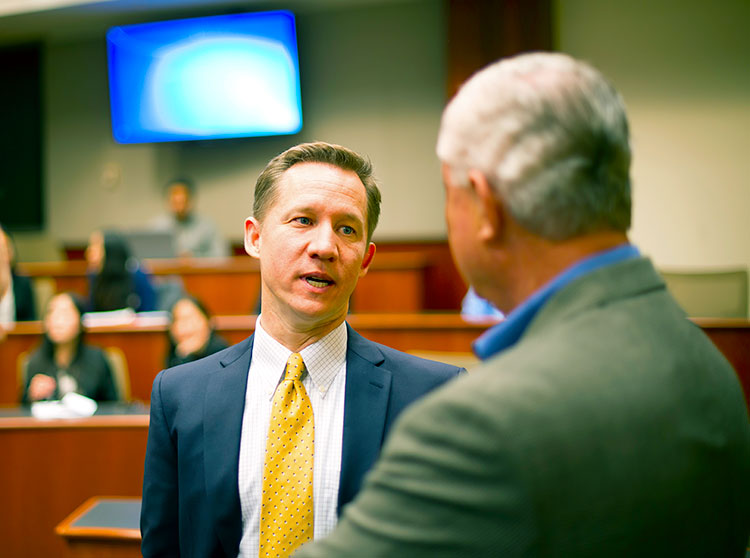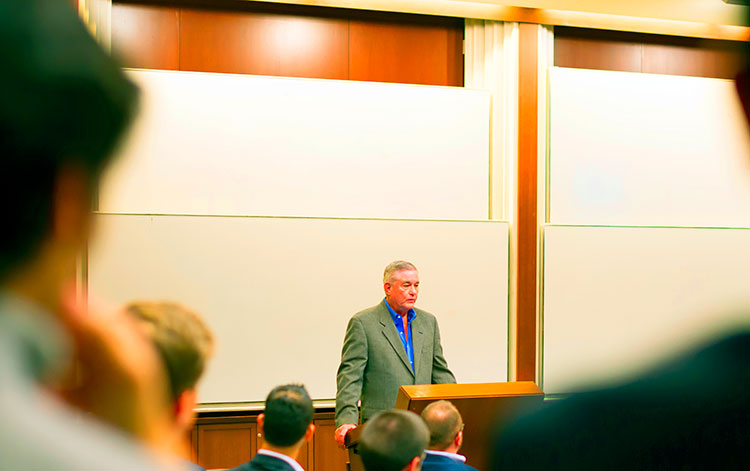New course honors Burkenroad Reports patron
“Aaron was one of the greatest, smartest investors I ever met,” says Peter Ricchiuti. “He was the consummate value investor, always looking for things that were out of favor. I learned so much from him.”

Ricchiuti, founder and director of Burkenroad Reports, is talking about businessman and private investor Aaron Selber Jr. (BBA ’50), who died in August 2013 following a long illness. A member of the Burkenroad family by his marriage to the former Peggy Burkenroad, Selber played a major role in the family’s decision to endow Ricchiuti’s program in honor of his late father-in-law, New Orleans coffee magnate William B. Burkenroad Jr. (’23), and he remained one of its biggest champions until his death.
This semester, the Freeman School introduced a new course to pay tribute to Selber’s lifelong commitment to Tulane University. The Aaron Selber Jr. Course in Alternative Investments is a finance elective dedicated to the wide-ranging category that encompasses everything from real estate and hedge funds to commodities, derivatives and futures.
“Aaron Selber was an astute investor but also a real gentleman and an extremely loyal supporter of the A. B. Freeman School of Business,” says Ira Solomon, dean of the Freeman School. “While he will be sorely missed, this tribute to Aaron that his family has created is destined to take its place along with Burkenroad Reports as one of the most exciting and innovative educational initiatives in university business education.”
While future editions of the course may explore other areas of alternative investing, this semester’s class focuses exclusively on the highly complex investing space that Selber liked best: distressed debt.
“Investors spend far more time talking about the equity of a company than they do the debt side, but the reality is that the value of the bond market is far greater than the equity markets,” says course instructor Myke Yest, professor of practice in finance. “Distressed debt was an area that Mr. Selber was truly passionate about, so what better way to honor him than to make an entire course about distressed debt?”
The course combines lectures and case studies on non-investment-grade bonds with talks from an all-star lineup of guest speakers, including James Duplessie (MBA ’84), head of Distressed Debt Strategies at Napier Park Global Capital, and Howard Marks, co-chairman of Oaktree Capital Management and one of the nation’s leading experts on distressed securities.

Kicking off the guest lecture series on Jan. 15 was Dewey W. Corley (L ’70), Selber’s longtime friend and business partner. Corley worked with Selber’s son-in-law Robert H. Autenreith (E ’74, MBA ’78) and all the members of the family to help raise $1.2 million to name the course in Selber’s honor.
“Aaron was an inspirational guy,” says Corley, who met Selber in the early 1970s and became his business partner in 1998. “He cared deeply about education, about Tulane University and about investing, so I think he’d be delighted to know that this course had been established in his honor.”
While students in the course will gain the technical skills necessary to analyze and value distressed debt, the class also features an experiential learning component in the spirit of Selber’s beloved Burkenroad Reports. Yest plans to have his students write analysis reports on distressed companies detailing why the company is in distress, what piece of its debt they’d recommend purchasing, and what the most likely return for investors is. In a crowded job market, Yest says the reports can help students gain a critical edge.
“We can have a curriculum that is technically very strong, but if we’re not giving students relevant, applicable experience, we’re not doing our job,” Yest says. “The Selber Course gives students not only some unique technical skills, but also a deliverable to show potential employers what they did at Tulane, and that goes a long way toward helping them to stand apart from the competition.”
Ricchiuti, whose program has been helping students stand apart from the crowd for almost 25 years, echoes that thought.
“Aaron was always interested in creating things at Tulane that weren’t available anywhere else,” Ricchiuti says. “Burkenroad Reports was one of those things, and now I think the Selber Course is as well. When students come out of it, they’ll have a set of skills that nobody else has, and that’s something I think Aaron would be very proud of.”
Interested in advancing your education and/or career? Learn more about Freeman’s wide range of graduate and undergraduate programs. Find the right program for you.
Recommended Reading
- Stewart Center hosts first MBA Experience Weekend
- Pierre Conner: The Future of Energy Is Now
- Finance Curriculum vs. Accounting Curriculum: How Are They Different?
- Business Analytics vs. Finance: Which Master’s Degree Is Right for You?
- Alum leverages MFIN degree to launch investment banking career
- Freeman Graduation Gift Guide
- Peter Ricchiuti: The Art of Making Things Make Sense
- What Can You Do With a Business Analytics Degree?
Other Related Articles
- Scientific Inquirer: Why Searching for Truth Online Might Be Making Us More Biased
- WDSU: Gas prices face uncertainty after US strikes on Iran
- Freeman announces new administrative appointments
- Alum celebrates Pride at Entergy and beyond
- Research Notes: Amanda Heitz
- Payments Dive: GENIUS Act is just the beginning
- Tulane study finds smaller companies get kinder online reviews - and empathy is the reason why
- Four honored with Freeman research awards
